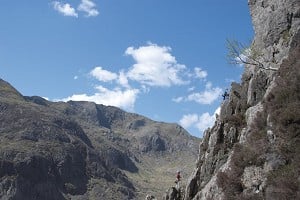
Ahead of an event both celebrating the 150th anniversary of the North Wales Quarrymen's Union and calling for a ban on English-language route names, Eben Myrddin Muse explores historic and ongoing tensions between locals and climbers in the Dinorwig Quarries.
Eryri is a cultural tinderbox. Visitors to any rural area can cause tension – this is the case all over the world, but it's a problem felt more keenly since the pandemic, especially in National Parks where housing crises are made worse by second homeownership (even though the quarries have been neatly cut out of the park). In North West Wales, the Welsh language has always meant that these issues have even higher stakes – it wasn't that long ago that a guerilla movement put holiday homes to the torch in Gwynedd during the Meibion Glyndwr arson campaign. There is still discontentment in Eryri.
An upcoming event at Llyn Padarn this weekend ostensibly aims to commemorate the North Wales Quarrymen's Union, but also holds a secondary goal to demand the protection of Dinorwig Quarry's Welsh place names with a council ban (somehow) on the 'new' English climbing route names. The people who have allegedly removed and displaced these names are rock climbers and the story has been taken up by multiple media outlets.
The slate quarries are beloved for the style, yes, but also for the sense of history you can feel there. The experience of rock climbing in the Llanberis slate quarries is unique and deeply meaningful to many of us. It hurts, therefore, to be accused of erasing that same history.
Local comedian Tudur Owen recently produced a segment in a TV series about Welsh place names. It's obvious that he relates to the Dinorwig Slate Quarries deeply; his grandfather worked in the quarry and his monologue (subtitles available) conveys a seething anger at contemporary, "new", climbing names for the levels and crags of the quarry. He clearly feels that the older Welsh names convey a more meaningful and rich history – the names of long-vanished farms under which the slate was extracted, names related to quarry owners, workers and past use of the land.
In a blithe comparison, he points out that in 'climbing culture', the simple tradition is for the first ascensionist to name routes, like some sort of rite of conquest and I suppose it is that. Ponc Penrhydd becomes 'Looning the Tube Level', Ponc Teiliwr (tailor's gallery) to 'G'day arête' and so on.
We can't actually deny that as a community, climbers have given new names to these places. Names passed verbally before making it into a new route book, a guidebook and then a website (this website). Filling a gap in our own knowledge. These names have now been passed down for generations themselves. To locals like Tudur, they feel like an imposition.
Is this reflective of general attitudes in the climbing community? Some definitely do dismiss the Welsh language as a curiosity, a relic, or a waste of public money. When UKC published a bilingual article for the first time, some of the comments were fairly mind blowing – for what was effectively an optional extra (free). One person emailed to ask if they could create a setting by which they'd never be subjected to Welsh language content again (there was no such reaction to the previous publication of a bilingual French article...). This isn't the attitude of the majority but there's no denying its presence.
Some of the clashing names at Dinorwig Quarry from The Daily Post.
And what of the early pioneers? I've read that they hopped the fences to explore the day after the quarry shut and who can blame them? In sporting terms, the slate was and is at the cutting edge of what's possible on rock – an internationally significant geological marvel which precipitated an utterly iconic era in the latter parts of the 20th century. Endlessly influential with a unique cast of characters; the era of the Quarryman, Comes the Dervish, and 'designer danger'.
Maybe these pioneers never fully understood or confronted the context by which their explorations took place. Still though, the most obvious example of this is route names. John Readhead was (is?) an artist and a shock jockey – he delighted in sticking it to climbers and the public alike with crude, sexually explicit names for routes. I'm sure he loves that we are still talking about his route names now, but to many, especially local people, those name choices betray a deep disregard or ignorance of the significance these quarries hold locally. It cuts through and we see it reflected in this rally and in the hostility many climbers are experiencing.
"At Dinorwig you have silly names from fantasy films, like Mordor. Many are offensive and immoral, some have sexual connotations. They're insulting and show a lack of respect to the families of the people who worked there." - Eilian Williams, organiser of Sunday's event.
Over a thousand men died there and the folk memory of that is persistent – it's painful and disgusting for many to see the places where real loved ones toiled or were killed bedecked with vulgarity in guidebooks and websites. I've heard it compared to painting a big red penis on a war memorial or family tomb.
It doesn't begin or end with Redhead, he's just the most commonly quoted example – the greater perceived harm is the eclipsing of original place names within the quarry by the imposition of newer (in some cases, deliberately provocative) names by climbers born out of lack of effort or basic ignorance. In this play we're cast as villains, offensively dislocated from the local psyche and real, painful history within the post-industrial landscape and people of Eryri.
The Risks
Why should we as climbers care? It doesn't really matter what it's officially called now, people still call it Snowdon. Many find the Bannau Brycheiniog a syllable too far. The number of Welsh speakers in Gwynedd is falling and to some this will be of no concern. I could make the argument here that the survival and persistence of a language enriches us all – but let's keep that for another article on another site.
Suffice to say that those upset about this are upset because of a pattern that they see as part of existential threat and the snuffing out of an essential part of their sense of self (hunaniaeth in Welsh). English is ubiquitous in Britain today and our minority language is struggling to stay afloat. Providing space for Welsh place names whether they're galleries of the quarry or the name of our highest mountains is the right thing to do.
But away from that, a more useful appeal might be that we should worry because there is a danger of this boiling over and threatening our access in the slate quarries and elsewhere. I've seen calls for the authorities to crack down on climbers entering the quarries to stamp out 'fraudulent' new names. In the past we have seen nationalist slogans daubed on treasured crags like the roadside boulder in Nant Peris and Llech Drws y Coed stating 'Wales is not for sale', an old nationalist slogan.
Access has always been delicate in the quarries where permission was never officially granted in the first place and we have weathered threats for summary bolt removal and escalating tensions with the landowner in the past. You can bet that landowner First Hydro will be taking an interest.
The Eagle in the Room
On the other hand, let's turn the lens on the organisers of this weekend's rally. Are they representative of reasonable Welsh speakers? I certainly hope not. The Facebook page of the event's organiser, Eryri Wen, features the simple "about us" description: "a monolingually Welsh Eryri". The name of the Facebook page literally means "White Eryri" (a white eagle has long been a symbol of Welsh nationalism linked with the pseudo-paramilitary group the Free Wales Army and a contemporary reference to the broader historical area of Eryri, to which the association with eagles (eryr) is generally understood now to be an error). The anger that many feel about the pressures on the Welsh language can erupt in the form of ugly attitudes and divisive rhetoric. As Welsh speakers we mustn't allow the progressive goals of the Welsh language movement to be co-opted in pursuit of ugly ethno-nationalism.
For those of us who straddle these worlds – of Welshness and rock climbing – watching this unfold is unspeakably bleak. To speak in defence of the very real climbing heritage which has developed now in the quarries for nearly 60 years and of which I feel a part of is to appear to some as an appeaser to the all-consuming influence of the English language.
To join the "Eryri Wen" brigade painting all climbers as intentional smotherers of the language and for the removal of people from our heritage, is in my mind the antithesis of anything I've ever campaigned for or wanted as a lifelong advocate for the Welsh language. What I recall demanding was the right to live life through the medium of Welsh (byw bywyd yn y Gymraeg) – that is, to ask for services, media, and space in which the language might thrive.
The Welshness that I aspire to is open-ended, internationalist and certainly not exclusively white! It's about knowing that languages belong to us all – as a unique, beautiful, living cultural asset and medium for life. Wales is, and has been for a very long time, a bilingual nation – there is no way forward in which a monoglot Eryri is one in which I want to live. Welsh is worthy on its own two feet and a part of me resents its being tossed into a new linguistic arena of the slate quarries.
Eryri (and Wales') past is complex and traumatic – but when I see folk who claim to be advocates for the language calling for enforcement to keep us out of our own industrial heritage by the force of enclosure, it makes my piss boil. Enclosure was part of the original trauma of these hills as the hated lord threw cottagers out and began to extract the slate with their slave money. We all deserve the freedom to access these quarries – and climbers aren't alone in loving spending time there anymore.
Looking Forward
So how do we progress? With some locals demanding the erasure of new route names and climbers unwilling to part with a rich and varied tradition of naming routes? In the case of Dinorwig there's a clear way forward: language evolves, meeting the needs of those using it. In the case of Ponc Penrhydd (Looning the Tube Level), Ponc Penrhydd describes the tier of the quarry – a feature that was of significance and utility to the quarrymen of old. 'Looning the Tube' on the other hand describes a line of weakness, carved by the quarryman, yes, but interpreted and completed by Cliff Phillips (rope solo) in 1984. Both of these names are designed to communicate something completely different - the tube is mostly rotted away and tumbled into the pit by now, but the name evokes the experience of the first ascensionist - it's additional to the history that was already there.
Messner's heroics on Everest didn't extinguish that of Tenzing and Hillary and if we do it right, we can climb Looning the Tube, on Ponc Penrhydd. Quarrymen named the level (ponc), and climbers named the climb. Similarly, I am told that of the many cliffs and crags in Eryri, several were originally named 'craig y geifr' (goats' rock). Climbers had a greater need of differentiating them and so named one of them Craig Ddu. In both cases, names have utility and language adapts to describe what is most useful to those using it.
In Welsh there are a dozen odd words for different variations of fields reflecting their working nuances and importance for those working the land. How many words do we have for variations on a 'handhold'? There isn't really a clash here, just ignorance - on both sides. Locals say that it would have taken no effort whatsoever for guidebook authors to reach out to local historians for clarification or correction – that's hard to deny. Authors have refrained from correcting, likely for fear of causing confusion with previous editions.
Things are changing though. For North Wales Bouldering Vol I (Mountain Crags) Simon Panton made the decision to adopt Welsh place names where known and documented even where there were existing and popular 'new' names. Infinity Boulder became Craig Cwm Glas, Sheep Pen became Gorlan, and so on. Route names remained the same because there is a material distinction between stumbling upon something and not knowing or trying to find out if it already had a name versus climbing something unique and new which merits a new name. As such, the finished product in which many more Welsh names are used feels like a more faithful depiction of the landscape – which is at a basic level what a guidebook is. It's a bestseller.
Calum Muskett, a local guidebook writer and fairly decent climber is currently writing a new guidebook for the Dyffryn Peris, Y Lliwedd, and Clogwyn Du'r Arddu areas. He shared his thoughts with me on the nuances of the subject of guidebooks and the Welsh language:
"As well as making sure the route descriptions and topo images are accurate, it's important to talk about the local environment, be that the rare flora and fauna, or the unique etymology. I feel like it's my responsibility to research the names of the different mountain features, be they crags, cwms or ridges, to make sure that those names are as "correct" as can be from a historical perspective, but also linguistically and giving favour to the Welsh language where translations have formerly been given preference.
"It's been interesting to see the recent trend of new climbs being given Welsh names and this guidebook will be the first to use Yr Wyddfa instead of Snowdon, Dyffryn Peris instead of the Llanberis Pass, and Y Lliwedd instead of Lliwedd; subtle differences to many readers, but part of a shift away from the normalisation of translated place names or English language replacement names. I'll also explore the etymology, breaching the 19th century myth linking Rhita Gawr with Yr Wyddfa and where many of the cliff names come from. It's been a journey and a pleasure working on this guide and capturing the zeitgeist of climbing in this amazing area."
For Calum, it's clear that the language and history of the area is very much a part of the story he wants to share with the readers of the new guidebook. Climbing and the Welsh language are not mutually incompatible or a destructive force on each other – my own experience and that of my peers proves this, many of whom have carved out a career in the outdoor industry or returned to live in Eryri due to the attractive, social, and healthy life that climbing helps support. The greatest threat to the language in its heartlands is the departure of young people for cities with greater amenities and job prospects – a rural economy guards against this and outdoor recreation is a huge part of the modern rural economy to the tune of hundreds of millions of pounds.
I want to return to the narrative of 'climbers are all English speakers who are here to rename and dismiss our heritage' though. I have a big problem with it because it ends up erasing people like me who were raised practically in the shadow of a slate tip. I had a picture of the same tip on my primary school uniform logo, spent my youth playing in a brass band formed to raise money for the widows and orphans of those killed in the quarries. I made toys and dams and dens from the slate. Learning about the great strike of Penrhyn influenced my personal politics and growing up in the post-industrial economic stagnancy of a slate valley shaped my whole life.
Yet I am also a climber through and through and there are lots of others like me. Some of them are even putting up first ascents and naming them in Welsh! Climbers like Zoe Wood and Osian Parry are marketable, inspiring and trying to make a living in this space – Zoe and Lewis Perrin even featured in the climbing film 'Adra' recently, which sought to acknowledge the living presence of the language and its speakers among the hills and crags of Eryri. We also shouldn't ignore or erase the Welsh-speaking pioneers who made strides and put up swathes of first ascents in the quarries, people like Ian Lloyd-Jones (who is tireless and whose son is now picking up the mantle). The climbing history of the slate quarries is additional to that which came before – that's how history works; the story unfolds and develops, and grows.
I guess the point is this: whether you're a Welsh speaker who believes all climbers are extractive leeches who hate the Welsh language, or if you're a climber who thinks it doesn't matter if you call it Lake Australia or Llyn Bochlwyd, I invite you to think again and reach across the aisle a little. If we are going to grow a new history beyond the slate quarries, in Eryri and in Wales, we should include all of us in it – and that means acknowledging (and correcting) mistakes where mistakes have been made and not seeking to stamp out a thriving culture of recreational rock climbing which brings joy and fulfilment to so many.
In another of Tudur's emotive videos on the subject, he tries to explain the significance of a name, along with co-presenter Lisa Jên Brown. His name is 'Tudur', he says, in his Anglesey lilt, not 'Tudor' and her name is 'Lisa' (Bethesda accent this time), not Eliza. They couldn't really be otherwise – and I think he's right, a name holds power, significance, inspiration and connection.
This goes for route names which titillate and thrill us, conjuring images of pure poetry on the rock face – but it also goes for the old names, imbued with experience, industry and lives lived long ago. There is room for both.
Welsh language learning tips
So! You're a climber and you've read this article and decided that it's a good idea to learn some Welsh – I love that for you! Here are some resources:
Basic Welsh intro – still makes a difference though!
Pronouncing Welsh place names.
Financial help for learning Welsh
Welsh immersion courses at Nant Gwrtheyrn (an amazing climbing area for which there is a brand new guide! It's also where my dad learned Welsh in the '90s).
A popular alternative way to learn Welsh via a podcast - Say Something in Welsh, developed by someone who learned Welsh themselves.
Want to learn Welsh for work? Well, there's support for that.
Get your daily dopamine fix with Duolingo Welsh!
Want to know why we're saying 'Yr Wyddfa' now?
Learning Welsh has been described by many as the most transformative, or the most frustrating, or the most rewarding, experience of their lives - I owe my own bilinguality in part to my father for learning it in the '90s. It's always worth giving it a try.










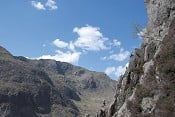
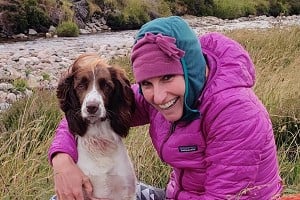
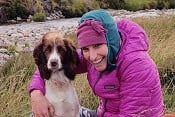
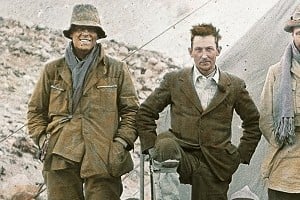
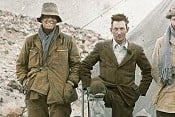








Comments
I think the correct approach is that made in the guidebooks mentioned - use Welsh names where they existed beforehand with English names mentioned alongside. It will take time (decades), but I think eventually the English names can be dropped. There is no good reason for English place names where the places had a name in Welsh already. Language and culture is what makes a place a place. I say all this living in a place where English wasn't the dominant language until the middle of the 1800s and only truly took off after WW2 when most of the local schoolchildren were evacuated to the mainland UK.
I enjoyed that! Really well presented, clearly thought out and balanced. Thanks for writing.
An interesting (sad) read and a chance to practise your Welsh -
https://www.peoplescollection.wales/items/8021#?xywh=-153%2C-1%2C847%2C850&cv=
It was interesting to see how many of the names have been preserved, albeit moved around.
Also.... 362 (6a)
A really enjoyable read. Nicely done, Eben!
I grew up in Llanberis, and my family from great-grandparents back worked in the quarries, so it's pretty clear what side of this argument I roughly fall on idealistically. I think the truth of the matter is, though, that the local community have completely lost touch with the surrounding landscape. How on earth do we expect climbers to come into the area and know the names of these locations when half of the people that were born and raised here don't? I'd heard of Australia and California as galleries in the quarry growing up but I couldn't have told you which ones they were, and I think that's all I could've named.
I think there's also some friction between the local Welsh speaking community and the climbing community that have moved in because they don't really mix.